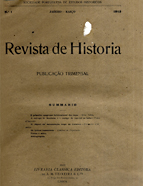

................................
The extinction of SPEH, with the exile of its main founder in 1928, dictated the end of RH, despite the fact that the last two issues already showed signs of a difficult survival. In conclusion, the question is justified: was the historiographical orientation plan suggested by Fidelino de Figueiredo in 1910, with the idea of synthesis, successful? In our view, only to a very limited extent. Many figures with a long track record were associated with the SPEH and RH, which, as one might imagine, made it difficult to achieve a certain homogeneity. Undoubtedly, taken as a whole, the articles published illustrate multidisciplinarity, in the sense that we see a diversity of topics covered, but, for the most part, the approaches remained within the prevailing historiographical lines, with the exceptions we have presented. In fact, the most frequent contributors with work understood as historiographical participated mainly in an orientation that can be classified as erudite, positive or methodical. It is therefore not surprising that, years later, Fidelino de Figueiredo acknowledged the limited scope of his project (curiously, in the Revista de História da Universidade de S. Paulo, which borrowed the name of the Portuguese journal), when he referred to many of the figures who made up the SPEH or contributed to the RH: “Were all these scholars historians, in the sense of builders of great plastic and interpretative syntheses of episodic collections? Not all of them (...) Many of them were merely benevolent and probos carriers of materials, some simple archivists. They all contributed solid and valuable documentary renovations to the historiographical work, but not all of them managed to elevate it. Many fragmented history (...) But this atomistic or anatomical decomposition is only one phase of historiographical work; it must be followed by reconstruction through various difficult operations of synthesis” (Historiografia Portuguesa no século XX [Portuguese Historiography in the 20th Century], 1954, pp. 336-337). Although it provides a portrait of Portuguese historiography in the first two decades of the 20th century, the Revista de História fell short of its founder’s grand intentions. And it fell short of its inspiring Revue de Synthése Historique.
This work is financed by national funds through FCT - Foundation for Science and Technology, I.P, in the scope of the projects UIDB/04311/2020 and UIDP/04311/2020.
